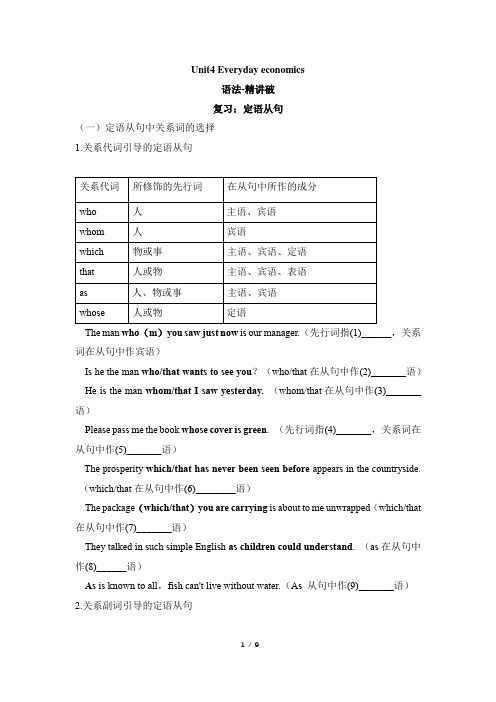新教材外研版高中英语选择性必修第四册全册各单元重点语法归纳总结
外研版高中英语选择性必修第4册 Unit 1 Looking forwards 单元重点回顾

basic adj. 基本的;基础的
basically adv. 基本上;大体上
12.arise v.(由……)引起;出现;发生;产生;起来;起床 arise from =arise out of由……引起/产生;从……中产生 arise from one’s chair/seat从椅子/座位上站起来 13.circumstance n.情况,情形 in/under no circumstances决不 in/under the circumstances在这种情况下;既然这样 in/under any circumstances在任何情况下 if circumstances allow/permit如果情况允许
重点语法
复习时态 1.I learned that Earth goes around the sun when I was in primary school. 2.Our school sports meeting is to take place next week. 3.You don’t need to describe her.I have met her several times.
单元重点回顾
Unit 1
英语
主题语境
人与自我 追逐梦想
重点词汇
1. in face v. be faced face up to lose face face to face
the face of 面对
with 敢于面对 丢脸 面对面
面对…… 面临,面对
2.take action采取行动 take steps采取步骤 take measures采取措施 take effect生效;起作用 take risks/a risk冒险 3.ambition n. 追求,理想 achieve/realize/fulfill one’s ambition实现某人的理想 ambitious adj.有理想的;有野心的
外研选择性必修第四册Unit4_Everyday_economics语法-精讲破

Unit4 Everyday economics语法-精讲破复习:定语从句(一)定语从句中关系词的选择1.关系代词引导的定语从句The man who(m)you saw just now is our manager.(先行词指(1)______,关系词在从句中作宾语)Is he the man who/that wants to see you?(who/that在从句中作(2)_______语)He is the man whom/that I saw yesterday. (whom/that在从句中作(3)_______语)Please pass me the book whose cover is green. (先行词指(4)_______,关系词在从句中作(5)_______语)The prosperity which/that has never been seen before appears in the countryside.(which/that在从句中作(6)________语)The package(which/that)you are carrying is about to me unwrapped(which/that 在从句中作(7)_______语)They talked in such simple English as children could understand. (as在从句中作(8)______语)As is known to all,fish can't live without water.(As 从句中作(9)_______语)2.关系副词引导的定语从句关系副词when、where、why的含义相当于“介词+which”结构,因此常常和“介词+ which"结构交换使用。
There are occasions (10)________(on which)one must yield.Beijing is the place where (11)________ I was born.Is this the reason why((12)________ which)he refused our offer?(二)定语从句的分类1.根据定语从句与先行词之间关系的紧密程度,可将定语从句分为限制性定语从句和非限制性定语从句。
2019外研版高中英语选择性必修四Unit4 单元语法详解课件

● 温馨提示:主句是疑问句时,首先要确定定语从先行词, 方法是将疑问句恢复成肯定句,然后进行辨别确认, 请观察 以下句子
a. Is this the factory __(_t_h_a_t_/w__h_ic_h_)__ we visited last week?
※肯定句:This is the factory(_th_a_t_/_w__h_ic_h)we visited last week.
1. I will never forget the day __w_h_e__n_ I first went to school. 2. I will never forget the day _w__h_i_c_h_/_t_h_a_t_ we spent in Beijing. 3. The house w__h_i_c_h_/_t_h_a_t_ we visited is being repaired now.
※先行词既有人又有物时,请观察以下句子
They talked about the persons and things (that) they knew in the school.
● 关系代词 that前不加介词; 非限定性定语从句不用 that 引导,请观察以下句子
a. This is the house in which Luxun once lived (in that)
d. He who has not been to the Great Wall is not a true man.
●不管先行词是人还是物,用 that 的两种情况 ※ 由 which 和 who 开头的特殊问句中避免重复, 请观察以 下句子
a. Which is the subject ( that ) you are going to learn next term? b. Who is the man that came to see you just now?
新教材外研版选择性必修第四册Unit2 Lessons in life单词短语句型语法提炼汇总

Unit 2 Lessons in life词汇积累①despite prep.即使;尽管②ahead of (时间、空间)在……前面;早于;领先③missing adj.找不到的;不在的;丢失的④be reunited with(使)重逢;再结合⑤on doing sth.一……就⑥result in 导致result from由……导致⑦a series of一系列;许多⑧indeed ad v.的确⑨be filled with =be full of 充满/挤满……⑩bravery n.勇敢;勇气;无畏精神brave adj.勇敢的⑪inspirational adj.启发灵感的;鼓舞人心的⑫far from根本不;远远不⑬anticipate v.预期,预料,预见⑭appreciate v.欣赏;感激;理解⑮make the most of=make the best of尽量利用;充分利用⑯insight n.洞察力⑰determine v.决定determination n.决心⑱tend to v.倾向于;有助于⑲get distracted by被……分散注意力⑳material possessions物质财富;物质财产○21abnormal adj.不正常的,反常的normal adj.正常的○22It is up to sb.to do sth.做某事由某人来决定○23be woken up被叫醒○24recognition n.承认,认可recognise v.辨认出○25be made up of =be composed of =be comprised with =consist of 由……组成○26be influenced by 被……所影响○27be based on 以……为基础○28recommend v.推荐;举荐○29get through完成,干完(尤指难做的任务或工作);度过,熬过(困难或不快的时期)○30reflection on对……的反思○31lose touch with和……失去联系○32keep in touch with sb.和某人保持联系○33go through经历,经受(尤指苦难或艰难时期)1.weak adj.虚弱的→weakly ad v.虚弱地→weaken v.(使)虚弱→weakness n.弱点;虚弱2.pessimism n.悲观;悲观主义→pessimist n.悲观主义者→pessimistic adj.悲观的,悲观主义的→pessimistically ad v.悲观地3.anticipate v.预期,预料→anticipated adj.预料中的;预期的→anticipation n.预料;预期4.possess v.拥有;占有→possession n.财产,财物→possessor n.拥有者;持有者5.recognise v.识别→ recognition n.承认,认可→recognisable adj.可辨认的→ recognisably ad v.可被辨认地1.possession n.财产,财物;具有,拥有;持有违禁物品①She was charged with possession. 持有违禁物品②The possession of a passport is essential for foreign travel.具有/拥有③He lost all his possessions in the fire. 财产2.recognition n.承认,认可;认出;赏识①He glanced briefly towards her but there was no sign of recognition.认出②There is a general recognition of the urgent need for reform. 认可③He received the award in recognition of his success over the past year.赏识Words and Phrases知识要点1far from 远非[教材P14]In fact,far from being a book about death,it's a book about life.事实上,这不是一本关于死亡的书,而是一本关于生命的书。
外研版选择性必修第四册Unit3 The world meets China单词短语句型语法提炼汇总

Unit 3 The world meets China词汇积累①gateway n.通往……的门户②oasis n.(沙漠中的)绿洲③ahead of (时间、空间)在……前面;早于;领先④glorious adj.辉煌的⑤commercial adj.贸易的;商业的;赢利的commerce n. (尤指国际间的)贸易;商业;商务⑥boast v.(地方、机构等)自豪地拥有(好的事物)⑦be known as 作为……而出名be known for因为……而出名be known to被……所熟知⑧testimony n.证据;证明⑨element n.要素;基本部分⑩mural n.壁画⑪cover an area of 覆盖……面积⑫vary from A to B 从A 到B变化⑬unique adj.唯一的;独一无二的⑭heavenly adj.天国的⑮decorate v.装饰be decorated with 用……装饰decoration n.装饰⑯depict v.描绘;描画⑰in detail详细地⑱peak n.高峰,顶点⑲reflect v.反映;反射;反思reflection n.映像;反映;表达⑳extraordinary adj.非凡的○21seal v.封上(信封);密封(容器);封盖……的表面○22hidden adj.难以看见(或发现)的;隐藏的;(地方)隐秘的○23a stone's throw一箭之地;一箭之遥;附近○24date from=date back to 追溯到○25thanks to 多亏了○26import v.进口○27export v.出口○28name v.说出……的名称○29reveal v.揭示;显示○30prosperous adj.繁荣的;成功的;兴旺的○31fade v.(使)变淡,变暗○32bring...to life 使……焕发生机○33the Belt and Road Initiative一带一路1.glory n.光荣→glorify v.赞美;美化→glorious adj.辉煌的→gloriously ad v.辉煌地;壮丽地2.boast v.(地方、机构等)自豪地拥有(好的事物)→boaster n.自夸者→boastful adj.浮夸的→boastfully ad v.自夸地;浮夸地3.religion n.宗教→religious adj.宗教的→religiously ad v.虔诚地4.heaven n.天国→heavenly adj.天国的5.strong adj.强壮的→strongly ad v.强有力地→strength n.力量→strengthen v.加强1.peak n.高峰,顶点;尖顶adj.高峰时期的,巅峰状态的v.达到最高峰,达到最高值①She is at the peak of her career. n.高峰②the peak of a roof n.尖顶③Oil production peaked in the early 1980s. v.达到最高峰④March is one of the peak periods for our business.adj.最繁忙的/高峰时期的2.coverage n.覆盖范围;新闻报道;(保险公司的)保险①magazines with extensive coverage of diet and health topics 覆盖范围②today's newspaper coverage 新闻报道③Medicaid health coverage for low-income families 保险Words and Phrases知识要点1vary v i.变化;不同v t.变更;改变[教材P26]The subjects of the Dunhuang murals vary from religious stories to scenes of everyday life.敦煌壁画的题材多种多样,从宗教故事到日常生活场景都有。
外研社必修四知识点总结

外研社必修四知识点总结外研社必修四是高中英语教材中的一部分,本书涵盖了高中英语四个学年的内容,包括了语法、词汇、阅读、写作等方面的知识点。
本文将对外研社必修四中的知识点进行总结,希望能帮助学生更好地理解和掌握这些知识点。
1. 单词在外研社必修四中,有很多重要的单词需要记忆和掌握。
这些单词涵盖了各个领域,包括生活、学习、工作等方面。
学生需要通过反复背诵、运用、巩固这些单词,特别是在阅读和写作中多多运用这些单词,以便能够更好地掌握和使用它们。
2. 语法外研社必修四中的语法知识点涵盖了各个层次,包括词类、句子结构、从句、虚拟语气、时态等方面的知识。
学生需要对这些知识点做到深入理解,特别是要掌握其使用方法和注意事项,以便在实际运用中能够正确使用这些语法知识点。
3. 阅读理解外研社必修四中的阅读理解部分包括了各种类型的文章,如记叙文、说明文、议论文等。
学生需要通过多次阅读这些文章,掌握其主旨、细节、逻辑关系等方面的内容,以便能够更好地理解和分析这些文章,并将所学知识应用到实际的阅读和理解中。
4. 写作技巧在外研社必修四中,写作技巧是一个重要的知识点。
学生需要掌握各种写作技巧,包括写句子、段落、短文等方面的技巧,以便能够更好地写好自己的作文。
同时,学生还需要多练习写作,通过不断地写作来提高自己的写作能力。
5. 听力和口语外研社必修四中还包括了听力和口语方面的知识点。
学生需要通过多次听力训练,提高自己的听力能力,同时还需要多练习口语,通过说英语来提高自己的口语能力。
总之,外研社必修四中的知识点非常丰富,学生需要通过不断的学习、训练和实践,来掌握这些知识点,以便能够更好地应用到实际的学习和生活中。
希望学生能够通过不懈的努力,掌握并运用这些知识点,取得更好的学习成绩和语言能力。
外研社必修四全册知识点归纳总结

外研版高一必修4知识点归纳Unit 1 Life in the Future重点词汇: alternative; arrest; brick; concrete; criminal; disability; entertainment重点短语in the future 将来care for 照顾;关心plenty of 大量的think about考虑instead of 代替be able to能够attach to连接到;附属于have an accident 发生意外;出事故for a start开始on the way out 在路上a few of一些be made of由…制成throw away扔掉;丢弃for sure确定place an order 排列顺序语言点用法过关1.alternativ.adj.替换的, 可供选择的(二者中)选择其一.考点归..(1) alternative energy 替代能源 alternative ways 可供选择的方法(2) have no alternative but to do 除……别无选择 as an alternative 作为一种变通的方法alternative to ……的替代物辨析:alternative 强调必须从两或多个中选一个choice 强调自由选择, 不论选择的方式多或少preference 强调按自己喜欢的方式进行选择2.ru.ou.用完;耗.考点归..run after 追求;追赶run at 冲向;突袭run away 逃走;逃跑run into 偶然遇见;撞上;陷入3.rel.o.依赖;依.考点归. rel.on.upo.s..依赖/依. rel.o.sb.t.d.sth.指望某人做某.rel.o.i.that.相信….指望….辨. rel.o.强调凭借经验判断是否可以相信或依赖, 侧重于从人品、感情方面的依赖、信赖. depen.o.强调从这个人或这件事中很可能得到支持或帮助。
外研选择性必修第四册Unit3 单元语法详解课件

testimony to how the Silk Road brought East and west together. (教材
P26)
c. Come a little bit closer so that you can get a better view. (教材 P26)
● since 的用法 ※ since 引导的状语从句中的谓语动词常用一般过去时且常为瞬间 动词,主句谓语常有现在完成时或一般现在时,且常为延续性动词, 请观察以下句子
a. It is just a week since we arrived here. b. He has lived in the city since I came here.
外研版新教材选择性必修四
Unit 3 The world meets China
单元语法详解
原创 Cao
2021
本单元重点语法
→ 状语从句
◆ 原句再现
a. You can only imagine how travellers felt when they saw the oasis of
Dunhuang ahead of them.(教材 P26)
c. He was watching TV last night while I was writing a letter. (同时发生)
※ while 引导的从句的谓语动词一般是延续性动词,且多用进行时; as则强调“一边….一边….”, 请观察以下句子
a. While we were having breakfast, John was talking on the telephone.
- 1、下载文档前请自行甄别文档内容的完整性,平台不提供额外的编辑、内容补充、找答案等附加服务。
- 2、"仅部分预览"的文档,不可在线预览部分如存在完整性等问题,可反馈申请退款(可完整预览的文档不适用该条件!)。
- 3、如文档侵犯您的权益,请联系客服反馈,我们会尽快为您处理(人工客服工作时间:9:00-18:30)。
外研版选择性必修第四册全册重点语法汇总Unit 1 Looking forwards .................................................................... - 1 - Unit 2 Lessons in life ......................................................................... - 4 - Unit 3 The world meets China .......................................................... - 7 - Unit 4 Everyday economics ............................................................. - 10 - Unit 5 Into the unknown ................................................................. - 14 - Unit 6 Space and beyond ................................................................ - 16 -Unit 1 Looking forwards动词时态根据新课标的要求,高中阶段需要掌握的10种时态是:一般过去时、过去将来时、一般现在时、一般将来时、过去进行时、现在进行时、将来进行时、过去完成时、现在完成时、现在完成进行时。
一、一般过去时、过去将来时、一般现在时、一般将来时[观察例句]1.She told us yesterday that she would not go with us if it rained.2.He will be twenty next month.3.We have meals three times a day.4.The sun rises in the east and sets in the west.[归纳用法]1.一般过去时:(1)表示过去某时间的动作或状态;(2)在时间及条件状语从句中代替过去将来时。
2.过去将来时:表示从过去某时间看,将要发生的事情。
3.一般现在时:(1)表示经常性或习惯性的动作、现在的特征或状态、客观事实及普遍真理等;(2)在时间及条件状语从句中代替一般将来时。
4.一般将来时:(1)表示将来某一时刻的动作或状态或将来某一段时间内经常的动作或状态;(2)其表现形式(以do为例)及一般用法为:will/shall do(表示客观上将要发生的动作等);be going to do(表示打算去做的事或根据某种迹象预示着要发生某事);be to do(表示按计划或安排即将要做的事或按照职责、义务、规定、命令等应该做某事);be about to do(表示即将要发生的动作)。
另外,go、leave等动词的现在进行时形式也可表示按计划或安排即将要做的事。
[名师点津]be about to do不与表示将来的具体时间状语连用,但可以和并列连词when(=and at that time)引出的分句连用。
二、过去进行时、现在进行时、将来进行时[观察例句]1.Jack was working in the lab when the power cut occurred.2.They are having a meeting now.3.—Can I call you back at two o'clock this afternoon?—I am sorry,by then I will be flying to Beijing.How about five?4.He is always helping others.[归纳用法]1.过去进行时:(1)表示过去某一时刻正在发生的动作,或过去某一个阶段内一直在进行的动作。
常用的时间状语有:at this/that time+过去时间;at...o'clock +过去时间;from...to...+过去时间;those days;just now等;(2)表示动作在另一个过去的动作发生时正在进行,常与when,while引导的时间状语从句连用;(3)一些非延续性动词可用过去进行时表示过去按计划、安排将要发生的动作,多用于从句中。
2.现在进行时:表示现在(说话人说话时)正在进行的动作或存在的状态,或现阶段一直进行着的动作,常与now;right now;at present;these days;at this moment等时间状语连用。
3.将来进行时:表示将来某一时刻或某一段时间里正在进行的动作,常与at this time tomorrow/the day after tomorrow;(by)then;from 1:30 to 4:30 tomorrow/the day after tomorrow等时间状语连用。
[名师点津]现在进行时及过去进行时常与always,constantly,continually,all the time等状语连用,表示反复出现的或习惯性的动作,或强调赞赏、厌恶、生气、好奇等感情色彩,不强调动作正在进行。
三、过去完成时、现在完成时、现在完成进行时[观察例句]1.He has received 3 letters so far.2.We had already learned 3,500 words by the end of last term.3.I have to see the doctor because I have been coughing a lot lately.4.I had hoped to see more of Shanghai.5.This is the best tea(that)I have ever drunk.[归纳用法]1.过去完成时:(1)表示过去某一时间或动作前已完成的动作或存在的状态(即表示“过去的过去”);(2)表示过去某一时间的动作或状态持续到过去的另一时间,常用的时间状语有by/until/before/by the end of+“表示过去的某一时间”;(3)表示愿望、打算的词,如:hope,expect,mean,intend,want,suppose 等,其过去完成时表示过去未曾实现的愿望或意图;(4)在“It was/had been+一段时间+since从句”句型中,since 从句的谓语用过去完成时。
2.现在完成时:(1)表示从过去某一时间开始一直持续到现在,也许还将持续下去的动作或状态。
常用的时间状语有:lately; recently;in the last/past few days/years;since then; upto now;so far等;(2)表示过去已经完成的某一动作对现在造成的影响或结果,注意这时说话者说话的重心在过去的事情对现在造成的影响上。
常用的时间状语有:already; just(刚刚); yet; before等;(3)在“最高级+名词”或“It/This is+the first/second...time”之后的定语从句中,谓语动词用现在完成时。
3.现在完成进行时:现在完成进行时是现在完成时和现在进行时的组合,表示从过去某时开始一直持续到现在并且还要继续下去的动作或表示到目前为止的一段时间里一直反复进行的动作,它既具备现在完成时的特征,又具备现在进行时的特征,如:它具备进行体的“未完性、暂时性、感情色彩”的特点。
Unit 2 Lessons in life被动语态被动语态的基本用法:不知道或没有必要指明动作的执行者是谁时用被动语态;需要强调或突出动作的承受者或事件本身时也常用被动语态(by短语有时可以省略)。
[观察例句]1.My washing machine is being repaired this week,so I have to wash my clothes by hand.2.I was sent to the village last month to see how the development plan had been carried out in the past two years.3.When fat and salt are removed from food,the food tastes as if it is missing something.4.The students have been working hard on their lessons and their efforts will be rewarded with success in the end.5.Steam engines were used to pull the carriages and it must have been fairly unpleasant for the passengers,with all the smoke and noise.[归纳用法]一、被动语态的构成:be +过去分词各种时态的被动语态形式(以do 为例)1.主动变为被动时,宾语成了主语,(作补语的)不定式前需加to(位置不变)。
The boss made him work all day long.→He was made to work all day long(by the boss).2.主动变为被动时,可将双宾语中的任何一个作为主语。
My friend gave me an interesting book on my birthday.→An interesting book was given to me(by my friend)on my birthday.→I was given an interesting book(by my friend)on my birthday.3.短语动词变被动语态时,不要掉“尾巴”(即不要丢掉后面的介词或副词)。
The children were taken good care of(by her).Your pronunciation and spelling should be paid attention to.4.情态动词,be going to,be to,be sure to,have to等结构变为被动语态时,只需将它们后面的动词原形变为“be+过去分词”。
